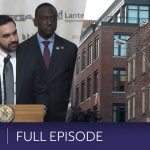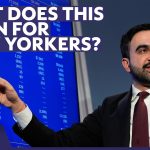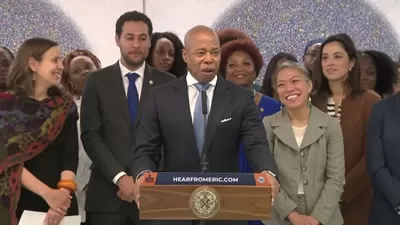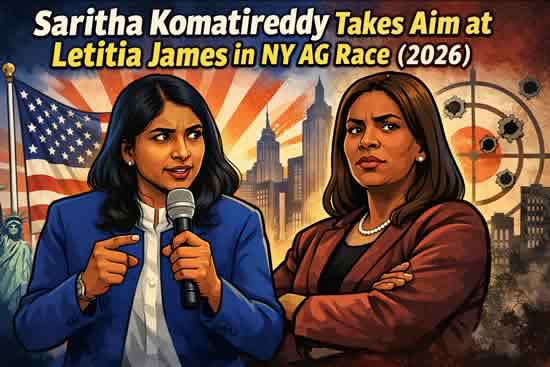As New York City grapples with a severe housing shortage, Mayor Eric Adams’ “City of Yes” initiative aims to revolutionize the landscape of urban living. But with widespread concerns about affordability and the impact on taxpayers, many are questioning if this ambitious plan can deliver real solutions. In this article, we analyze feedback from community leaders and critics alike, exploring the political and economic implications of the Mayor’s proposals and their potential to reshape the future of housing in the Big Apple. Stay tuned for insights that matter to every New Yorker.
Transcript: Mayor Adams Holds In-Person Media Availability
Mayor Eric Adams Holds In-Person Media Availability
Deputy Mayor Fabien Levy, Communications: Good morning, everybody. My name is Fabien Levy and I serve as deputy mayor for Communications for the City of New York. Thank you for joining us today. From keeping New Yorkers safe on our streets and in our subways to creating a more affordable city, our administration is working every day to deliver for working-class New Yorkers.
To tell you more about our efforts, the mayor’s once again senior leadership here at City Hall to answer your questions. So joining us today, we have Mayor Eric Adams, Chief of Staff Camille Joseph Varlack, Deputy Mayor for Health and Human Services Anne Williams-Isom, Deputy Mayor for Housing, Economic Development and Workforce Maria Torres-Springer, Deputy Mayor for Operations Meera Joshi, Deputy Mayor for Strategic Initiatives Ana Almanzar, and Director of Intergovernmental Affairs Tiffany Raspberry. So I’m now pleased to turn it over to Mayor Adams.
Mayor Eric Adams: Thanks so much, Fabien. Busy week. It was great to be at the town hall yesterday in the Bronx as we were going over some very important issues. The goal is clear, keeping New Yorkers safe, making the city more affordable and livable. And that is the goal, and we’re going to stay focused on that goal.
When we talk about keeping the city safe, one of the major problems, as we heard even yesterday in the Bronx, are ghost cars with paper plates and the illegal scooters. We are really pleased last week we announced a new task force with NYPD and DSNY, and hats off to Deputy Mayor Banks and Sanitation Commissioner Tisch, and Interim NYPD Commissioner Donlon. We took 625 illegal ghost cars in just 12 days of operations. These guys have become so comfortable with these cars on our streets.
Not only are we focusing on them at the toll booth, where we seized more than 2,300 of these illegal vehicles, but now we’re going out at night and we’re finding them where they’re parked because in between their criminality, they parked the vehicles and then they go back to them. Amazing, amazing result in such a short period of time. D.M. Banks was right when he stated that these cars were just hidden in plain sight.
Another important initiative is our B-HEARD, something that Deputy Mayor Williams-Isom talks about all the time. We’re really happy to announce that we hit a key milestone, responding to 73 percent of all eligible 911 calls in its pilot area. B-HEARD is a great way to have mental health professionals respond to those calls of service where you don’t need police to respond.
In the last fiscal year, B-HEARD teams responded to nearly 15,000 calls. That’s double the amount of calls our B-HEARD teams are responding to from previous years. And so we’re looking forward to continue to see how well this tool is used to really de-escalate the interaction between police and those with mental health issues.
Affordability, housing for formerly homeless New Yorkers, Deputy Mayor Maria Torres-Springer always talk about housing, we saw that come up last night also at the town hall. In the last fiscal year, the Department of Social Service, under Deputy Mayor Williams-Isom and her team, helped more than 18,500 households move out of shelters and into stable homes, a 24 percent increase from the previous year. We’re also creating, which we believe is important, 800 deeply affordable homes for New Yorkers in the shelter system with cityFHEPS vouchers.
It is crucial that we build more housing. We are on a real pursuit to deal with the issue of building more housing. You heard us state it over and over again, 1.4 percent vacancy rate. We have an inventory problem. City of Yes is very much engaged and we’re hoping that all of our council persons look at this. This proposal aims to produce more than a hundred and eight thousand new homes in an over 15 year period so this is crucial that we start housing New Yorkers and in order to do that we have to build more housing. I’m going to turn it back over to you Fabien.
Deputy Mayor Levy: Thank you mayor.
Mayor Adams: How are you, Marcia?
Question: Since we met a week ago, there have been the following things: revelations that five more countries are being probed, the police commissioner has had his home raided by the federal agents looking for documents, and the sheriff is being investigated for some of the actions he’s taken.
I wonder, last night at the Bronx Town Hall meeting, you said when you fight for New York, stuff happens. And you also seem to imply that you feel like Job. So I ask you, do you feel like Job? And what do you want to say to New Yorkers about all of this? And I have another question.
Mayor Adams: First, I want to thank Tom for coming back into public service and what he brings there. And I thank him for that. And I also want to be clear, our federal authorities must work closely with the New York City Police Department. We’re dealing with terrorism, we’re dealing with dangerous gangs that come across our borders. We’re dealing with immigration issues, so it’s important to do so.
And many New Yorkers have communicated to me about the actions that took place last week, which is a matter, a private matter, that he was dealing with. It had nothing to do with his role as a police commissioner. And I think that we’re going to continue to do what I say over and over again.
My job is to deliver for the people of this city and to stay focused. And so those New Yorkers who communicated with me and stated that they have questions for what happened with our commissioner, for documents that appeared from 20 years ago. I think the U.S. Attorney’s Office and FBI has to answer that. I don’t have the answer to those questions.
Question: How do you personally feel about all this? I mean, it’s like this constant drip, drip, drip from the federal agencies.
Mayor Adams: Well, when you say, how do I personally feel about that, you’re going to have to wait to get my book, you know? It would be outlined in my book. But what I must do, what I say over and over again, a things that come up in life, as you talked about the Job moment, things that come up in life, they always come up. There’s always something happening in life. Can you stay focused on your mission?
That’s what I’ve done. You know, not eight, nine, 10 months ago when this investigation first came to light, Look at how the city continued to progress. We didn’t stand still. We didn’t stop. We continue to produce housing. We continue to bring down crime. We continue to progress, and we’re going to continue to do that.
That is what I must do. I’m going to fight for New Yorkers. I’ve always done that. I’m not going to stop doing that. And you know, no matter what comes in the midst of that, I’m going to continue to fight for the people of this city. And that’s what I’ve done as a cop, and that’s what I’m going to do as the mayor.
Question: So my second question is this. With all of the people leaving the administration, some not related to these investigations, how are you going to hire people? I mean, with all these headlines and with all these stories that seem to find their way into the media and the political conversation, how do you find people who are going to fill these jobs?
Do you need a new police commissioner? Do you need a new counsel? Do you need a new corporation counsel? Do you need a new health commissioner?
Mayor Adams: Hold on. Let’s go back for a moment. We have over 300,000 employees. And when you go to our appointment section, we’re bringing in two new employees that are going to be part of leadership.
Rory Whelan is coming on board, reached out to us and said, I want to be in this game. I want to help New Yorkers. We’re going to bring in other new folks. We are constantly bringing in new people. So let’s not give the image that all of a sudden, there are people saying, hey, I don’t want to be in city government. That is just not true. Our appointment division is processing applications, and just about once a week, I go over to see new people who are joining our administrations.
And people come in and out of government. Dr. Vasan has been here, he’s going to be here for three years. Three years. That is a wear and tear on you. And when you look at others who have been here three years, three years into this administration, they come, they serve, they produce a great quality product, and then you go on. You know, being in government and being inundated constantly, it wears on you. And I think the right for people, when they finish the time they want to serve to do something else, that’s excellent. But we have a deep bench. Let’s not act like we don’t have a deep bench.
You know, even when you look at in the mayor’s office, the chief counsel office, I have qualified people because of what Brendan McGuire and Lisa built. I have qualified people that are able to carry out the job every day. This city government is a deep bench, and we have a reservoir of talent in this city. We’re not going to have a problem filling any of these positions. People want to be in city government.
Question: Good morning, Mr. Mayor. Good morning to the team. How are you?
Mayor Adams: Great.
Question: As we talk about Dr. Vasan, the health commissioner, what a classy guy. One of the few people that I’ve met that’s warm inside and out. Yeah, we’re going to miss him. He comes to the reset talk show and talk about mental health and health across the board. And we know that he is one of the proponents of social media affecting children. So as we talk about the ban of cellphones in schools, parents are now pushing back because of guns being discovered in high schools across the city. How do we plan to?
Mayor Adams: Pushing back on the ban of cell phones?
Question: Pushing back on their kids being able to use cell phones to earn those school hours.
Mayor Adams: I’m sorry, pushing back?
Question: When I say pushing back, they’re against the school ban. They’re against the school ban.
Mayor Adams: Yeah. First, let’s talk about Dr. Vasan. I really like him a lot. And he was so forward thinking. And I would come up with these ideas, and he’ll figure out how to implement them from Teenspace, videos for teams for mental health support, 24 hours, seven days a week, to what we did around social media. He’s leading the voice on that, the work on that, to health, all of those areas.
But now you have the opportunity to meet some other warm people inside and out. These folks up here, this is a great group of human beings. Some of the finest people I know, and they go beyond the call of duty. What Dr. Vasan did is really just a symbol of what all of these individuals up here and folks in city government. So I am so happy he gave the city three years of his life. And I thank him for doing that. And it came with some great sacrifices, but he was committed. And I look forward to his next step. And he has not disappeared. He said, Eric, I’m always here to assist.
And I’m glad you talked about that there are some parents that are pushing back with the cell phone ban. Remember what I said? I know New Yorkers. I have a master’s in Public Administration, but a PhD in people in this city. And it may sound like a bright idea that everyone agrees. Once you implement a policy, you’re going to see voices come from all over. So you better get it right. You better communicate with people. You better let people know what to expect. And you better be able to make your stick.
That’s why the ban was reversed two times before. I’m not going to rush just because the loud number of people say, we need to do it, we need to do it, we need to do it. No, we’re going to get it right, and we’re going to implement it correctly.
Question: Good morning, everyone.
Mayor Adams: Yes, good morning.
Question: To bring it back to law enforcement, Mr. Mayor, a recent court order review found that the NYPD is, quote, lenient in disciplining officers who engage in illegal stop and frisks, end quote.
How is the administration ensuring that figuratively the watchers are being watched? And what could be done differently to assure the public at large that, like any other citizen, or even more finely, officers are being held dutifully accountable in every regard, such that more of the public feels assured that both the police will do them individually no harm, and that they’re some of the best in the business.
Mayor Adams: So listen, I cut my teeth in stop and frisk. Stop, question, and frisk is how I cut my teeth in reform. Testifying in federal court, the judge, NYPD versus Floyd, judge mentioned me in her ruling against the Police Department.
We were almost doing a million stop, question, and frisk searches a year. And over 80 percent of them were Black and brown residents of the city. So I know what abuse of stop, question, and frisk is. We’re a long way from those days. But we must continue to improve the product. And that product is if someone is abusing that tool, if they’re abusing it in a reckless manner, illegal manner, they must be held accountable. If they need to be retrained, they have to be retrained.
And so we’re going to look at the report. We’re going to learn from the report. And we’re gonna make sure that we can use that tool in a strategic way to assist in going after the illegal guns off our street. Over 18,500 illegal guns we removed off our streets by doing precision policing and not abusing the tool. But we’re a long way from a million stop, question, frisks that are carried out each year. But we’re gonna review the report and we’re gonna make sure we make the adjustments accordingly.
Question: I guess my question is really also more of rapport and how it seems with the public as well, with the work that you and the administration are doing. How is it that we’re ensuring that the public knows that this is happening, so that when police go on trains, they go on buses, they see them on platforms or wherever, that they feel as safe as when the Fire Department comes in. And I feel very safe with them being around, knowing that they will never harm me. How will you tell the public that you’re doing such a great job? How do you do it?
Mayor Adams: Great question. My monitoring of what the public feels are based on the 31 town halls, the 18 older adult town halls, the youth town halls, going into my churches, moving through the community, riding the trains. And as you see, their concern is public safety. And anyone who believes when that passenger walks out of the subway station and he’s a police officer, they’re not feeling good, then they really don’t have their fingers on the pulse of New Yorkers.
New Yorkers want their police. They don’t want their police to be abusive. But New York City residents love their police, and they’re always asking for more police. I don’t hear it. I have yet to be at one town hall where someone stated, can you take the police out of my community, off my block, off my subway station? And so the numerical loudest is not speaking on behalf of the overwhelming public. Every question that was around law enforcement was about, we want our police. Where am I going? How are you?
Question: Do you have any response to reporting that the Fed subpoenaed you, your election committee, and City Hall for information about interactions with five countries. And have you or any members of your administration received target letters?
Mayor Adams: Okay. I said this last week, and I’m going to state what I stated. I’m not going to do this daily reporting. I said that before, and I’m going to continue to state that. And we have the largest Jewish population outside of Israel is in New York. Yes, I have a good relationship with Israel, as in many countries. I had African countries that sat down and met with me yesterday at Gracie Mansion. UNGA is here. UN is here.
Why would it be a surprise that I have a relationship with Israel, one of our partners, I think one of the America’s greatest partners in the largest Jewish population? So, whatever information is needed, we’re going to turn over, but we’re going to respect the fact that federal agencies have stated they don’t want us talking on these reviews as they’re taking place. Let me respect that. It’s going to go to process.
Question: Hi, Mr. Mayor.
Mayor Adams: How are you, Kelly?
Question: Good. How are you today?
Mayor Adams: Quite well.
Question: I wanted to follow up about the police commissioner, the interim police commissioner. Have you spoken to him since the search warrants? And what type of assurances? You mentioned it being a private matter. What type of assurances has he given you? We’ve spoken to him since the search warrants. And what type of assurances, you mentioned it being a private matter. What type of assurances has he given you that that private matter won’t conflict with his public duty? And he won’t either have to resign or step aside.
Mayor Adams: I think that he is a great New Yorker. Formerly a special agent in charge, headed the Homeland Security for the state. And he and I communicated, and I am comfortable with his communications with me.
But again, let’s be clear, from what I read, and of my knowledge, we’re talking about something, items from 20 years ago. And New Yorkers raised concerned on what happened last week with him after seven days in my administration. But the U.S. Attorney’s Office would have to answer that, and the FBI would have to answer that. I don’t have the answer to that question.
Question: And I just wanted to ask, what type of message are you sending to those within your administration about everything that’s going on between all the federal probes? How do you keep morale high when they’re seeing resignations, other officials thinking about resigning?
And I know you got asked about people joining the administration, but what about the ones already. You mentioned, you tell New Yorkers you’re staying focused and [not] distracted, but what’s your message to everybody else, even the ones sitting at your dais, you know, top officials are being looked at. What’s your message to them daily?
Mayor Adams: Well, I think you could answer that in the MMR report, the Mayor’s Management Report. When this first came to light, people were saying, they were saying the next day, the next day, go back and look at the next day when this investigation first came to light. Go back then. What were people saying? Eric, you’re too distracted. You know, Eric, you need to step down. No, we stepped up.
We stayed focused. This is a real history lesson of how an administration came in with a real focus on how we’re going to deliver for New Yorkers and fight for New Yorkers, 8.3 [million] New Yorkers. And we’ve done that. You know, so you can’t ignore the numbers. You cannot ignore the numbers. You could ignore everything else, but you can’t ignore the numbers. We brought down crime, we brought more jobs to the city, we continue to build housing, we continue to increase tourism, we continue to roll out these major projects through Deputy Mayor Meera Joshi, Deputy Mayor Torres-Springer.
And so people were saying January 1, 2022, on my third day, hey, you should step down. I mean, come on. I have to fight for New Yorkers. And we have done that. And we’re going to continue to do that. And I think that’s the real lesson here that I tell Jordan, and I tell all of his friends. You know, life is going to throw you some curveballs. You have to hit it out the park. Because no one is going to sit later and say, why did you not accomplish the task? My task was to be elected, and serve, and protect, and fight for New Yorkers. And I’m going to fight for New Yorkers every day.
Question: Does that mean you don’t have any concerns about more resignations from top officials?
Mayor Adams: If you have been following government for some time, like some of you in this room have, employees and staffers come and go. Come and go. Very few remain throughout an entire term. They come and go. And while they’re here, I have only one ask. Give it your all, and that’s what we have done. Every day, we wake up and we give it our all.
And I’m excited about what the future and what tomorrow holds for us. And we thank them for their service. I cannot thank Dr. Vasan enough for his service, Lisa for her service, Eddie for his service. I thank them for their service. Working in government is hard, folks. You know, it’s hard when you work in government, but you give your heart and you walk away feeling as though you accomplished something.
Deputy Mayor Williams-Isom, she has to be so pleased that she’s been able to navigate 217,000 migrants and asylum seekers and not one child or family sleeping on the streets of the City of New York when others surrendered in other municipalities. Deputy Mayor Maria Torres-Springer. She’s breaking these records of people who are in homeless shelter finally getting a home. I mean, how rewarding could that be? It’s hard, but it’s rewarding.
And I love every day being the mayor of the City of New York, changing the lives of New Yorkers and everything that comes with it. I am more excited now being mayor than I was when I took my oath of office in the beginning.
Question: I feel like we’re asking the same question all over again in different ways, but our community is very close to your administration, precisely because of the migrant crisis, how you’ve handled that, and we have had concerns from communities asking us, you know, what’s going to happen with the administration, because they are hearing the reports, they are hearing the investigations, you know, the Commissioner Caban stepping down, being Hispanic.
So what do you tell the Hispanic community, because they are now worried whether this administration will be able to continue, maybe perhaps you will have to resign, what would you tell them to reassure them?
Mayor Adams: I would tell them this is our city, mi casa es su casa, and we’re going to be all right, because you have a great team of people that are going to continue to operate in the city. And we’re going to continue to fight on behalf of New Yorkers and move this city forward.
Question: No plan to resign on your part, sir?
Mayor Adams: Resign on my part?
Question: Yes.
Mayor Adams: I’m stepping up, not stepping down. I have a city to run that I will continue to run.
Question: Yeah, Hi Mr. Mayor.
Mayor Adams: How are you?
Question: Good. The Mayor’s Management Report, one number, the numbers that were dismal was EMS. North of 10 minutes response time, brain death is like in that six to seven minute window. We have a situation where it takes 40 minutes to turn around an ambulance from a hospital. You have a situation where, I guess the post said a story, one in five cardiac patients is surviving intervention in the field.
You’re someone who’s positioned yourself as an advocate for working people. And the people greatest at risk are the men and women that work in high danger occupations, police, firefighters, of construction. Shouldn’t all the city’s unions and people be concerned about this deterioration of this thing that can make a difference between a breadwinner coming home or dying on the job?
Mayor Adams: Working class people, as you know, is crucial for me. That’s why we settled over 94, 95 percent of our contracts, 97 percent of our contracts. Some of them were our longest 13 years, like our ferry boat operators. We’re getting almost a 96, 97 percent ratification rate from those who are voting on the contracts.
So it is clear my focus has been on working class people from housing to public safety to low income New Yorkers and putting money back in their pockets. So we’re very clear on that. Listen, we have to deal with the congestion problem on our streets, but not only that, Our team has analyzed, you know, what is taking so long for ambulance to get back out. And we’re looking at how long the release time, we’re doing some things in the hospital. We’re really refocusing our attention on how do we get those ambulances back out on the road so that they can continue to respond and bring down the response time.
It’s a very complicated series of things. Everything from the serious congestion that we have in the city with so many vehicles from the far higher vehicles to others. But the goal is to bring down the response time. That is our goal to do so.
Question: Just to follow up, though, one of the unions said it’s not you’re at the table with EMS now. Have you thought of going to one of those negotiating sessions to demonstrate your actual hands-on interest?
When you ran, they endorsed you because they thought, here’s a blue-collar mayor who gets it. They have a net, and it cuts along race and gender lines. I mean, that job is primarily men and women of color. What happens is people get a promotion to the Fire Department and don’t look back. So it’s a young job. And when we lose experience like that, that hurts the overall response.
Mayor Adams: Without a doubt. And when Renee, I like to say Champion, her name is Campion, our commissioner of Labor, when she calls me in and says, Eric, it’s a good time for you to come and sit down the table, like I have on several of these negotiations, I do so. But I have a lot of faith in her. She’s going to land the plane and we’re going to treat our EMS employees with the level of dignity and respect that they deserve.
Question: Hi, Mr. Mayor.
Question: How are you?
Mayor Adams: I’m good, thanks. How are you?
Mayor Adams: Good.
Question: Over the last few weeks, several of your mayoral challengers have been pretty vocal about the federal investigations. The responses varied a bit person to person.
Mayor Adams: I’m sorry, you said several of my mayoral?
Question: Mayoral challengers have been pretty vocal about the investigations. The response has varied a bit person to person, but without getting into too much detail, Comptroller Lander, for example, he said his definition of good government doesn’t include multiple FBI investigations. Scott Stringer has described your city hall as rudderless and chaotic. Senator Ramos has said New Yorkers are losing trust in the government and that they deserve better.
How do you feel about your challenger’s response to the investigations? And then I have one other question after that.
Mayor Adams: They were saying that on January 1st, 2022. Listen, their noise don’t match the numbers. That’s all I can say. Their noise, it does not match the number. And it doesn’t match the numbers. So we’re going to keep doing what we’re doing, delivering for New Yorkers. And I’m focused on people, not politics. So they’re going to do their political thing. I have to be focused on the people of the city and fighting on behalf of the people of the city.
We’re moving full speed ahead, great team, and anyone that can look at our numbers and define it as being rudderless is — that’s some creative speaking.
Question: Okay, and then one other follow-up to that. After watching the released body cam footage of last week’s subway movie shooting, some elected officials have argued that Derrell Mickles did not pose an immediate threat to the officers when they opened fire on him. released body cam footage of last week’s subway police shooting.
And there’s been a few councilmembers local to the district that it occurred in that have called for the police to face discipline. And then Public Advocate Williams, he wrote in a statement that he thinks the mayor deliberately misinformed the public. Last week, you said that the officers showed restraint.
In light of the released footage, do you want to respond to the criticism that I mentioned? And do you plan to visit the families of the New Yorkers who were shot? I understand you visited the police, but I’m curious about the families as well.
Mayor Adams: I was in the subway system as a transit cop. I constantly remind people. And I know what it takes to try to de-escalate a situation. And I remember one situation when I had to wrestle with someone that had a knife, was trying to stab a passenger. And it is very easy to look back and look at the video where you can hit pause, you can hit stop, you can hit delay, you can go and get something out of the kitchen and come back and look at it again. That’s not real life.
The person who had the knife ran towards the police officer. Those officers, several times, attempted to say, drop the knife, drop the knife, drop the knife. And so when you’re looking at it through the comfort of your home and you’re able to move at the speeds that you want, that is not real life. And those officers did what they were trained to do. They used a taser. The gentleman just pulled the taser out.
This is a person that has been arrested over 20 times that we could talk of. He had a clear mission to carry out a violent act, and I thank God that those officers took the necessary precaution. And my heart goes out to the family. I spoke with the mother and daughter in the hospital that day after visiting the officers, one of the officers who was shot. And so, no one wants to have innocent people that are the victims of these shootings.
It’s like I didn’t want an innocent father and grandfather in Queens on Farmers Boulevard where a 15-year-old discharged a gun, and that round struck the family of the grandfather. And so, you know, these are real issues. Too many guns on our streets, too many people that are violent, and this individual was a violent person with a violent history. How are you?
Question: I’m good, thank you. Good. So, 2 questions for you. One, just to deal with Sheriff Miranda, do you still have confidence in him and are you concerned at all about the investigation that’s looking into possibly how his office handled cash when it comes to those illegal weed stores?
And then the second question, we know you’ve traveled to Israel, China, and Turkey, but I was just looking to see if you’ve traveled to Uzbekistan, Qatar, and South Korea as well.
Mayor Adams: You said you’re looking into that?
Question: I am, yes, thank you.
Mayor Adams: You know, I have never been to Uzbekistan. I would love to go there. I heard it’s a beautiful country. I traveled to Seoul, Korea, when I was in the State Senate.
But what is this not having confidence in Anthony? I mean, will you guys go from not having confidence, not having confidence, not having confidence, this class closed down 1,100 smoke shops when they’ve, on my understanding of the procedure, when they voucher money, it’s videoed and it’s counted with the NYPD and the Sheriff’s Office so that they can make sure, because, you know, people are very concerned when it comes down to vouchering money. So yes, I have confidence.
He’s doing the job that New York is asking him to do. And I don’t know where the, do I still have confidence come from? You know, the Sheriff Department, NYPD, joint operation through Operation Padlock to Protect took my $78 million of illegal cannabis off our streets, not in the hands of our children and families. And so, why would I not have confidence? And I’m not understanding that question.
Question: I guess, you know, with the investigation, do you just feel like, you know, are you concerned that things were handled improperly, or do you feel like there’s nothing there for the investigation to find?
Mayor Adams: This guy has handled, his team with the NYPD, they have handled over $78 million in illegal cannabis. I got a lot of confidence in him. How are you?
Question: I’m all right. How are you?
Mayor Adams: Good.
Question: Good. First of all, how long do you plan on keeping the Interim Commissioner Donlon in place? Are you looking for a permanent replacement, or would he be included in that list? And would you use a committee to, like a selection committee?
Mayor Adams: Yes, and we’re going to make sure we have the right fit. NYPD is very dear to me. Everyone knows public safety is a prerequisite to prosperity, and all eligible people are being considered. And once we have a formal announcement, we’re going to do like we always do when we have a formal announcement.
Question: [Inaudible.]
Mayor Adams: Not at this time. What’s happening? [Crosstalk.] Only if you want to.
Question: I appreciate that. I was wondering if, given the investigations into your travels to these other countries, do you think your travels there or people that you’re dealing with in those travels is being perceived as working on behalf of those foreign governments?
Mayor Adams: I have no idea at all. I have no idea at all. I work on behalf of New Yorkers, and wherever I go, I am a proud New Yorker and I let people know that. So, when I’m in Tel Aviv meeting with the residents of Israel or wherever, I am talking about the greatness of this city. Everywhere I go, I talk about New York, if it’s private or public travel. New York is the greatest city on the globe.
Question: Hi, Mayor.
Mayor Adams: How are you?
Question: I’m well. How are you? I’ve got three questions, the third is a follow-up.
Mayor Adams: We’re going to have to narrow it down. We’re not going to, you know, because everybody’s going wild. Question going wild. Got to narrow it down. Give me your number one best question that you want to ask.
Question: My number one best question? All right, no Yankees, Mets, got it. Clearly, you’re tired of answering all these questions about the investigations that we’re answering, and you don’t want to have to answer them week after week. Those are your words.
With everything seeming to mushroom, a new city official under investigation, more countries tied to your campaign. Do you think the feds are just fishing for something and won’t stop until they find it?
Mayor Adams: Well, first, it’s not that I’m tired of answering questions. That’s not it. I answered the questions. I would love to. Trust me when I tell you, I would love to just give you a whole list of my thoughts on this. I’m a very opinionated person. I would love to do that. It’s just not appropriate to do that.
An investigation is taking place. I must stay focused on my job. And if I don’t do that, then I’m not going to continue to get the wins that I have been able to receive. And so I think that all of this will come to an analysis that everybody is going to be able to look over to, the answers, questions I don’t have. And I’m not going to do anything that’s going to interfere in an investigation.
I say that over and over again. I’m going to continue to, uh, do the job I’m supposed to do as the mayor of this city in New York, and I’m gonna fight for New Yorkers, you know, and I’m going to continue to do that.
Questions: Mr Mayor, I have. I have two questions. I’ll try to ask them quickly. In the course of our reporting on these investigations, people this week are telling us that they’re bracing for the possibility of potential criminal charges coming as soon as this week, related to fundraising. Have your attorneys, Mr. Mayor, gone in to ask the feds not to charge you?
And second, I’d like to clear up some confusion about two of your closest advisors/confidants, Ingrid and Frank. So Ingrid Lewis-Martin is always seated right next to you here. She’s been gone since before last Tuesday’s news conference. And there have been different explanations. We’ve been told she’s in Japan. She’s not in Japan. Some people think that you guys are at odds over your loyalty to some of the people you’re under investigation. Can you clear that up?
And on Frank Carone, when he left your administration, you said that he would serve as chair of your campaign. But now your campaign tells us that Frank Carone has no formal role in your campaign and actually never had any formal role. So is that true? And was there a decision for him to stop serving as campaign chair, because he does business with the city? And if he’s not, who is your campaign chairman and your campaign strategist?
Mayor Adams: OK, first of all, I stated and I answered that before. And I’m not going to continue answering over and over again.
My legal team is managing the legal strategy for the investigation. Let them handle their job. My job is to do the city. And that’s the beauty of it. When you hire competent teams, you don’t have to worry about what they’re doing. They’re very competent. They’re going to do their job. I’m able to do my job.
Ingrid is on vacation. So I don’t know who’s calling you up, saying that Ingrid and Eric is at odds, that Ingrid doesn’t want to sit to the left anymore of Eric. I don’t know who’s doing that. Whoever’s doing that, that is part of folks who are constantly trying to find another story, another narrative. Ingrid is on a long-needed vacation, a long-needed vacation. And I am hoping she’s having fun. And I am not annoying her at all. And when she texts me, I say, Ingrid, enjoy your vacation. We got this.
So Frank has been a long friend for many years. He wants to be as helpful as possible in the re-election bid. And whatever role he wants to play, he’s welcome to roll. We haven’t started out staffing up yet, because we like to wait until we spend our money wisely. And once we announce our official staff, we’re going to do so.
Question: Hi there.
Mayor Adams: How are you?
Question: I’m Well, good. A while. Yes. Yes. The federal probes are obviously making national headlines. Two quick questions. Yes. Did you see this coming? And where do you see yourself a year from now?
Mayor Adams: Did I see…
Question: You talked about being prepared, being a mayor, and knowing that you’re going to have to deal with different situations and scenarios all the time. Did you see this coming in terms of the level at which people have left your administration? And where do you see yourself a year from now?
Mayor Adams: Okay, let’s go back, because I’m really lost when people say the level of people that have left your administration. There is no level of people that have left my administration. The normal turnaround of people leaving administration, three years, we’re three years in. Dr. Vasan is leaving in December, that’s three years. Three years I’ve been on the front line. Eddie was in policing for over, I think, close to 40 years. This is wear and tear. And so I think that the natural transition that people say, I want to do something else with my life. I don’t have a problem with that. And I tell my team all the time.
Question: But did you see the federal probes coming?
Mayor Adams: I’m going to answer your question, OK? I tell my team all the time that you have to do this work until you’re ready to transition out. And so when you go back to the question of, did you see probes coming that you wanted to focus on, that you need to be focused on whatever unexpected things happen, life is unexpected.
So I don’t know where unexpected things come from. No one, no one sends me a letter saying hey something unexpected is about to come to you, Eric. It was unexpected for me to wake up losing my sight because I had diabetes I didn’t know I went to bed seeing I woke up the next day. I couldn’t see. You know it was unexpected for someone to drive up next to my car and shoot out my car windows after calling my name.
They didn’t tell me they were gonna shoot out my car windows. And so life [is] unexpected. But you know what when I got that diabetes diagnosis, I found a way to heal myself. When someone shot out my car windows, I went and took the lieutenant exam and passed. All of those hurdles showed me my character. Mommy said, baby, you’re going to find yourself in dark places. It’s not a burial, it’s a planting. And so I’m not buried, I’m planted. I’m ready for the next journey in my life. And so a year from now, I see myself again raising my right hand, being called the mayor of the City of New York.
Question: Hi, Mr. Mayor. How are you?
Mayor Adams: Hey, what’s going on?
Question: So just following up on Tim Pearson, your top aides, you’ve repeatedly touted his effectiveness in contracting, specifically migrant contracting. You’ve said he saved the city millions of dollars. What can you concretely point to that he has done to save the city’s money on these specific contracts that has led to the savings?
And so since the investigation is, one of the investigations is going into his role in contracting, the allegations being that there’s some potential legal kickbacks. Is he still at the helm of providing these contracts?
Mayor Adams: No, no and then. No and then. That was the end. We are going to… our chief of staff, Camille, there’s some clear examples of where he renegotiated and brought down the cost of contracts, clear examples. And we’ll give you some of those so you can see. Some very clear examples that we went from the emergency that we had, because it was an emergency that we dealt with, as we often talk about, trying to fill all of those beds, trying to get the food contract, the security contracts, and there was some clear renegotiations that we were able to do to drastically bring down the cost of those contracts, and we’ll see that.
And the chief of staff is evaluating whatever new operations we want to put in place, what learning experience we have, whatever new oversight, and that’s what we’re gonna do. The goal is to make sure we save taxpayers’ dollars, and I think we’ve done a great job of bringing down that cost. When we instituted, before the budget, a 30 percent peg of bringing down the cost, because we wanted to bring down the cost of those migrants and asylum seekers’ contracts. That was the goal and the mission, and it was all hands on deck to do so. Not only Tim, but all hands on deck to do so. It’s going to be the whole team that’s going to do this to get it right. What’s going on, Monica?
Question: Dr. Jay Varma’s comments came out. Some councilmembers, but also public, they demand action. Yesterday there was a demonstration in front of City Hall. I’m asking you, Mr. Mayor, do you consider reinstating and compensating those city workers who lost their job because of those COVID mandates?
Also, what do you have to say to those employees who lost their job because of those mandates not only in the city but also in the private sector, and then Mr. Mayor, are you going to support the idea of of the former Mayor Bill de Blasio and his administration to testify and get accountability for their actionsduring that time?
Mayor Adams: You know, Dr. Jay has not been kind to this administration about our excellent ability to navigate us through COVID, what we did to get us out of COVID. There was a lot of outside voices who were saying what we should have done, should not have done, but we were successful in doing so.
I’m not going to return the same favor to him. He has to deal with that. And what his actions, they do not change the facts. We had a major pandemic. There were rules that were put in place. People chose not to follow those rules. And his behavior doesn’t change the fact that we save lives because of the rules that were put in place. And I think Mayor de Blasio made some tough decisions as well as other leaders, executives, and they carried out those decisions. But I need to be focused on the city, not on, you know, what his actions were.
Question: Good afternoon, Mr. Mayor, how are you?
Mayor Adams: What’s happening?
Question: Busy, busy lately. So I know you don’t want to talk about specifics of the investigations and the subpoena regarding multiple countries. But will you at least commit to releasing the travel schedules and any other relevant information, which is subject to FOIL, about your visits to Israel, China, Qatar, South Korea, and I forgot one, that one also.
Mayor Adams: You said, do I agree to releasing?
Question: Can you release your travel schedules and relevant communications with country leaders? We’re all going to FOIL for this, but it’s been taking a while. You could just release that this week for us.
Mayor Adams: Okay, so to be clear, Qatar and Israel were the only countries as the mayor of the city when I was mayor. Those are the two, Qatar and Israel. And both of them went through the necessary COIB approval in the process. And so there’s no reason to not show what the schedule was for those trips. Those were both good trips.
[Crosstalk.]
Question: Hi, Mr. Mayor, on gun violence. have seen a series of incidents in recent weeks, including the shooting of a 17-year-old boy outside McKee High School. Now, I know you tout the statistics frequently, and I’m just trying to get a sense of what you’re doing specifically to keep kids safe in schools and what more your administration could be doing to ensure kids are safe.
Mayor Adams: Yeah, you know, that shooting was extremely unfortunate. There were a number of cases cases of guns in schools. And the question of what are we doing to keep the children safe is really looking at the real fact that, of my knowledge, we have not had any shootings in our schools. Many people were calling for the disband of school safety agents. I said no on the campaign trail, and I lived up to that.
Those school safety agents, our warning in schools, our metal detectors in schools, utilizing all the forms to prevent the guns from coming in, in the first place. And if they’re able to slip through, um, having a real school safety team to identify them, use our tip hotlines. A lot of the young people report when someone is carrying a weapon as well. And so when you look at the fact of our team is, understand[s] the paramount importance of making sure our children are safe.
And we have been living up to that and hats off to our school safety officers. You know, the number of dangerous weapons that have been confiscated in schools have dropped by 13 percent from 23 to 24. The entire public safety team, our coordination with the precinct commanders and our principals, we have made sure that there are regularly scheduled meetings with precinct commanders and principals so that they can communicate with each other. So we put in place a very extensive operation of making sure that we are proactive and responsive to keep guns out of our schools.
But it just really personifies or symbolizes that we have too many guns on our streets. And that is why we’ve been zero-focused on removing those 18,500 guns off our streets or 400 guns off our streets.
What’s up Liz?
Question: I see you have a town hall with business leaders today. Yes. And then at the top, you mentioned Rory Nealon. So I wanted to ask you to clarify, is he thinking of joining the administration? And in what role? And what’s your relationship with him? And what’s the feedback you’re getting from the business community in this moment?
Mayor Adams: Speak to them all the time. Speak with many of our business leaders all the time. And they, I don’t know if they created the model, But I heard the motto somewhere. They say, Eric, stay focused, no distractions, and grind. Keep turning the city around the way you’re doing, bringing in jobs, making it easy to do business in the city.
And many of them said, you were the first mayor we saw in eight years prior to you coming in. And so they understand their priorities are in order, just like those folks at that town hall, that we have to produce for everyday working class people. And they said, keep doing what you’re doing.
Question: And [inaudible] thinking of joining your administration?
Mayor Adams: I’m looking forward to it. You know, we are going through the exact role. He has a lot of talents. I knew him when I was in the State Senate. I’m really excited to have him come in. There are many things that he could do. He has a lot of experience on so many different levels.
Question: I have a question on City of Yes. Are you concerned at all once it hits the Council that the troubles that your administration has been going through recently will make it harder for the Council to get behind a proposal that was already fairly controversial in some neighborhoods?
And also, could you just describe politically, it seems as though there’s sort of an inverse situation here where some of the members who are normally critical of you, progressives, are willing to support this plan, whereas your base in Brooklyn and Queens, those neighborhoods are not as supportive as those members. How are you approaching that?
Mayor Adams: People need housing, and everyone is going to have to, you know, vote with their conscience. People need housing, and that doesn’t change. And we all know what the vacancy rate is because we say it over and over again. We need housing in this city, and this is a very aggressive plan to do that, to get the housing. And I’m hoping that all the Council people will look at that. We had a conversation yesterday with a few Council people that understand we need housing. We cannot get any clearer. We got a great plan to do so this is something that everyone should get behind.
Deputy Mayor Maria Torres-Springer, Housing, Economic Development and Workforce: Can I add a few things?
Mayor Adams: Yes you can.
Deputy Mayor Torres-Springer: Given where we are with the City of Yes so it’s an important week with City of Yes for housing opportunity tomorrow the City Planning Commission will be voting on the set of proposals then after that it goes to the City Council and just to be clear about what has happened over the course of the last couple of years since we released the proposal we have visited with hundreds of community boards.
We have four borough presidents who voted in favor. We have close to 20 community boards who voted in favor. We have more than 150 community-based organizations that are part of the Yes to Housing Coalition, dozens of town halls, many, many roundtables with faith-based organizations.
Those are – describe some of our work to to make sure that we are responding to the statistics that are out there that the mayor has mentioned that New Yorkers tell us. So in this moment, there are a number of political analyses that might be taking place about the City of Yes for Housing Opportunity, but let me tell you what hasn’t changed.
What hasn’t changed is the analysis of the housing crisis that we are in, that 1.4 percent vacancy rate that tens of thousands New Yorkers, mostly women and children, slept in shelters last night. That we have grown hundreds of thousands in terms of population and jobs and we haven’t kept up. And so our work, and we’re really encouraged to work hand in hand with the City Council from this point forward, is to not betray the voice of the people who say that they need action. And so that is our work over the course of the next several, the next couple of months and we are more committed than ever of getting this bold, ambitious, generational opportunity to fix our housing crisis over the finish line.
Question: I think originally they said they were going to get an eviction notice on September 10th.
Mayor Adams: Yes.
Question: That probably hasn’t happened. Is there any change of plans? Are you still putting in the senior affordable housing project? Have you met with the leaders? What are you going to do about the parkland that they’re worried is going to disappear?
Mayor Adams: I don’t think I have been any clearer than we need housing and I have to lead. I’m going to take a lot of criticism because we hear many places that people don’t want to build housing. We sat down with leaders, and part of the conversation, if they had an alternate way of doing it, Deputy Mayor Maria Torres-Springer sat down and communicated with them.
We were unable to do that, and so we’re going to move forward with the plan to do so. And there is a park in that area. People said there was not a park in that area, but there is a park in that area, and there’s going to be park green space in the new project. But, you know, to be able to build housing 100 percent for seniors is, you know, this is a real concern. I see it all the time with my seniors in the city that they, you know, they need housing. We have a housing crisis in the city.
City Hall Blue Room Lower Manhattan September 24, 2024
Here are two critical questions from a Republican perspective for BigNY.com and a conclusion optimized for Google:
Critical Questions:
- Impact on Taxpayers: Mayor Adams claims that his administration is focused on addressing New York’s housing crisis through projects like the “City of Yes” initiative. However, critics argue that these plans often come with high costs, further burdening taxpayers already grappling with inflation and rising living expenses. How does the Mayor plan to ensure that these housing projects don’t lead to higher taxes for working-class New Yorkers?
- Government Overreach: While affordable housing is a key concern, many Republicans argue that government-driven solutions often result in inefficiency, bureaucracy, and long-term mismanagement. How does Mayor Adams plan to strike a balance between promoting private sector involvement and preventing government overreach in solving the city’s housing crisis?
Mayor Eric Adams faces growing criticism from Republicans and local communities over his housing policies and economic strategies. As concerns about taxpayer burden and government overreach continue to surface, the debate around New York’s future intensifies. Will the Mayor’s ambitious “City of Yes” plan succeed in addressing the housing crisis, or will it deepen existing divides in the city’s most critical neighborhoods?
Stay tuned to BigNY.com for the latest developments on this pressing issue shaping New York City’s future.














